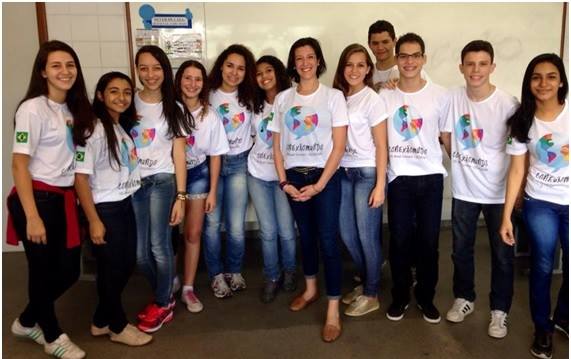Silviana Brunele, the director of elementary and high school education at SESI and SENAI Linhares, speaks with us about the SESI and SENAI systems’ structure, the benefits of the Conexão Mundo (or World Connection) program, and how their mission fits into Brazil’s economic development goals. Listen to the interview (in both Portuguese and English) or read the summary below.
Both SESI and SENAI are part of FINDES, or the Industry Federation in Espirito Santo. SESI is an organization that provides services in health, leisure, and education for the industry community. SENAI’s main purpose is to provide technical training for individuals who would like technician and engineering positions in Brazilian industry. While they do have a main headquarters in Brasilia, from where general policies are created and distributed, the organizations have autonomy from state to state. State programs are able to run their programs as seen appropriate, so long as they do not conflict with the main mission established through the federal office.
According to Silviana, the Conexão Mundo program is an important project for SESI and SENAI because it allows students an advantage in the job market. In my opinion, they have an advantage for several reasons: As Brazil becomes an internationally recognized economy, workers may be required to travel abroad with their respective companies and come into contact with more English speakers in the professional setting. The same situation would happen as foreign companies look to set up shop in Brazil and bring their own engineers and management. While the company may be Austrian, Korean, or German, the universal language connecting technician to management is still English. A workforce that can communicate across the whole company is a much more efficient and therefor attractive workforce. Lastly, there are several programs encouraging Brazilian students to travel to the United States to obtain quality education in science, technology, engineering, and mathematics (STEM) with the purpose of returning to their country with a well-honed skill set. Of course, U.S. universities require English proficiency.
SESI and SENAI have launched programs such as Conexão Mundo to amplify STEM education in response to Brazil’s skilled labor force shortage. It is precisely their mission: To provide technical professionals for industry and the development of the economy. Silviana points out that the main fault, however, is not the lack of technical knowledge. The main challenge is producing professionals that will truly make a difference in business and industry as individuals. A professional that can make an impact needs other skills that are less technical, such as creativity, critical thinking, and proactivity. Silviana hopes that programs like Conexão Mundo will encourage these traits in their students and benefit them in their careers.

